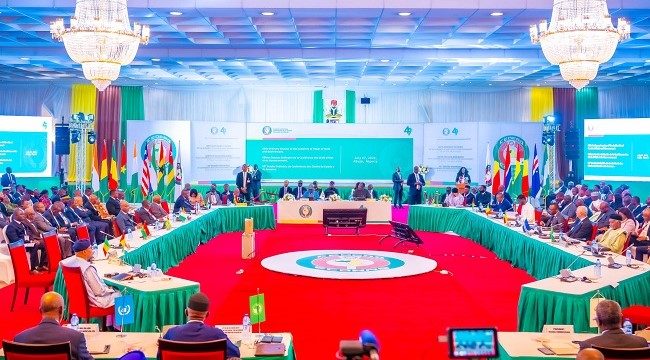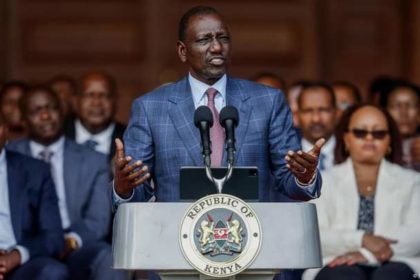By Adeyemi Adekunle
ABUJA, NIGERIA — West African leaders gathered in Abuja on Sunday for a high-stakes summit under the banner of the Economic Community of West African States (ECOWAS) amid growing fissures within the bloc.
The meeting comes at a critical juncture as Burkina Faso, Mali, and Niger reaffirm their “irreversible” decision to exit the regional group, threatening regional stability, trade, and security cooperation.
The 15-member bloc, long seen as a linchpin for economic and political integration in West Africa, now faces one of its most severe challenges since its inception in 1975.
The military-led governments of the three Sahel nations accuse ECOWAS of aligning with former colonial power France and undermining their sovereignty, grievances that have led to the formation of a rival coalition, the Alliance of Sahel States (AES).
Ahead of the Abuja summit, Burkina Faso, Mali, and Niger reiterated their firm stance to leave ECOWAS during a joint ministerial meeting in Niger’s capital, Niamey, on Friday. Their joint statement read: “The ministers reiterate the irreversible decision to withdraw from ECOWAS and are committed to pursuing a process of reflection on the means of exiting in the best interests of their peoples.”
This exit, which becomes effective in January 2025, could have far-reaching consequences for free trade, border movement, and security operations in a region already plagued by jihadist insurgencies.
The three nations, engulfed in political instability following military coups in recent years, have increasingly pivoted away from Western allies, particularly France, and have strengthened ties with Russia in a bid to stabilize their territories.
The growing influence of jihadist groups across the Sahel remains a grave concern for the bloc, especially as ECOWAS strives to contain spillover effects in neighboring states.
At the center of discussions in Abuja is whether regional leaders can convince the breakaway states to reconsider their position while acknowledging their grievances.
Senegalese President Bassirou Diomaye Faye, appointed in July as ECOWAS mediator, remains optimistic despite the hardline stance of Mali, Burkina Faso, and Niger. Speaking last week, Faye said he was “making progress” in talks with the AES states and emphasized the necessity of preserving relations in the face of mounting security challenges. “There is no reason for them not to maintain relations, especially given the security situation,” he said.
Togo’s President Faure Gnassingbé has also played a crucial mediating role, albeit with limited success. Following ECOWAS sanctions imposed on Niger after its July 2023 coup — the region’s sixth in three years — tensions escalated significantly.
The sanctions, including trade restrictions and border closures, were intended to pressure Niger’s junta to reinstate constitutional rule but instead deepened the divide between ECOWAS and the military-led regimes.
Burkina Faso, Mali, and Niger share a common narrative: successive military coups triggered by growing public discontent over their governments’ inability to curb jihadist insurgencies and rampant insecurity.
The three nations have criticized ECOWAS for failing to assist meaningfully in tackling the insurgencies while accusing the bloc of bowing to Western influence, particularly from France.
ECOWAS’s threat of military intervention following the coup in Niger last year exacerbated tensions, solidifying the resolve of the three nations to forge an independent path. The Alliance of Sahel States, formed earlier this year, reflects this shift — a confederation that emphasizes regional cooperation without the perceived influence of external powers.
The breakaway nations’ realignment toward Russia has also been a flashpoint. Moscow has strengthened its presence in the region through military cooperation and the deployment of the Wagner Group, a Russian paramilitary organization. While this has drawn criticism from Western nations, military juntas in the Sahel view Russia as a more reliable partner in their fight against jihadist insurgencies.
The departure of Burkina Faso, Mali, and Niger from ECOWAS raises concerns about the bloc’s ability to maintain regional stability and cohesion. The absence of these nations will not only fragment security cooperation but also undermine the bloc’s economic integration efforts.
ECOWAS has long championed free trade and movement within the region, enshrined in its core principles. The exit of the three nations could disrupt cross-border trade routes, particularly for landlocked countries like Niger and Burkina Faso that rely heavily on access to coastal ECOWAS members like Nigeria and Ghana for imports and exports.
The security implications are even more alarming. ECOWAS, alongside international partners, has played a key role in coordinating joint military operations to combat jihadist groups across the Sahel. The withdrawal of Burkina Faso, Mali, and Niger — countries at the epicenter of the insurgency — threatens to unravel years of progress in containing extremist violence.
Adding to ECOWAS’s challenges is Guinea, another member state led by a military regime since a 2021 coup. While Guinea has not joined the AES alliance, it remains a source of concern for ECOWAS leaders. Under pressure, Guinea’s military government initially promised to organize elections by the end of 2024 but recently admitted it would not meet this deadline, further testing ECOWAS’s authority.
For ECOWAS, the Abuja summit represents both a moment of reckoning and an opportunity to recalibrate its approach to the region’s evolving political landscape. While military interventions and sanctions have been wielded as tools of enforcement, critics argue that ECOWAS must adopt a more pragmatic and inclusive strategy to address the underlying causes of instability in member states.
Nigeria, as ECOWAS’s largest economy and political heavyweight, has played a central role in steering the bloc’s response to the crisis. Earlier this year, Nigeria’s top military commander met with Niger’s army chief to strengthen bilateral security cooperation, signaling a softer approach to engagement.
However, analysts warn that without meaningful dialogue and a shift in ECOWAS’s stance, the rift with the AES states could widen further. “The exit of Mali, Niger, and Burkina Faso is not just a political statement but a sign of deep distrust between ECOWAS and its member states,” said Dr. Ousmane Koulibaly, a West African political analyst. “The bloc needs to address these trust deficits while recognizing the unique challenges facing the Sahel.”
As the Abuja summit unfolds, the absence of Mali, Niger, and Burkina Faso looms large. The stakes are high for West Africa — a region grappling with economic hardship, political instability, and a rising jihadist threat. Whether ECOWAS can salvage its relationship with the breakaway states will determine its ability to remain a cohesive and effective regional bloc.
For the millions of people living in the Sahel, the outcome of this diplomatic standoff holds life-and-death implications. Communities already ravaged by violence and poverty are desperate for solutions, not further fragmentation.
Senegalese President Bassirou Faye’s mediation efforts, while promising, face immense challenges. A breakthrough would require concessions from both sides, with ECOWAS acknowledging the grievances of the AES states and the military regimes showing willingness to engage in good faith dialogue.




